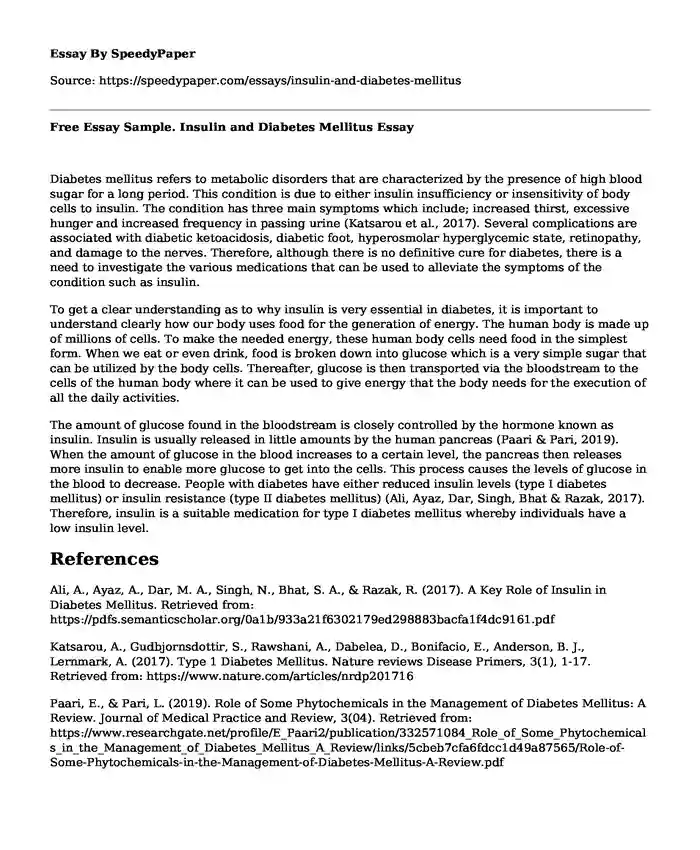Diabetes mellitus refers to metabolic disorders that are characterized by the presence of high blood sugar for a long period. This condition is due to either insulin insufficiency or insensitivity of body cells to insulin. The condition has three main symptoms which include; increased thirst, excessive hunger and increased frequency in passing urine (Katsarou et al., 2017). Several complications are associated with diabetic ketoacidosis, diabetic foot, hyperosmolar hyperglycemic state, retinopathy, and damage to the nerves. Therefore, although there is no definitive cure for diabetes, there is a need to investigate the various medications that can be used to alleviate the symptoms of the condition such as insulin.
To get a clear understanding as to why insulin is very essential in diabetes, it is important to understand clearly how our body uses food for the generation of energy. The human body is made up of millions of cells. To make the needed energy, these human body cells need food in the simplest form. When we eat or even drink, food is broken down into glucose which is a very simple sugar that can be utilized by the body cells. Thereafter, glucose is then transported via the bloodstream to the cells of the human body where it can be used to give energy that the body needs for the execution of all the daily activities.
The amount of glucose found in the bloodstream is closely controlled by the hormone known as insulin. Insulin is usually released in little amounts by the human pancreas (Paari & Pari, 2019). When the amount of glucose in the blood increases to a certain level, the pancreas then releases more insulin to enable more glucose to get into the cells. This process causes the levels of glucose in the blood to decrease. People with diabetes have either reduced insulin levels (type I diabetes mellitus) or insulin resistance (type II diabetes mellitus) (Ali, Ayaz, Dar, Singh, Bhat & Razak, 2017). Therefore, insulin is a suitable medication for type I diabetes mellitus whereby individuals have a low insulin level.
References
Ali, A., Ayaz, A., Dar, M. A., Singh, N., Bhat, S. A., & Razak, R. (2017). A Key Role of Insulin in Diabetes Mellitus. Retrieved from: https://pdfs.semanticscholar.org/0a1b/933a21f6302179ed298883bacfa1f4dc9161.pdf
Katsarou, A., Gudbjornsdottir, S., Rawshani, A., Dabelea, D., Bonifacio, E., Anderson, B. J., Lernmark, A. (2017). Type 1 Diabetes Mellitus. Nature reviews Disease Primers, 3(1), 1-17. Retrieved from: https://www.nature.com/articles/nrdp201716
Paari, E., & Pari, L. (2019). Role of Some Phytochemicals in the Management of Diabetes Mellitus: A Review. Journal of Medical Practice and Review, 3(04). Retrieved from: https://www.researchgate.net/profile/E_Paari2/publication/332571084_Role_of_Some_Phytochemicals_in_the_Management_of_Diabetes_Mellitus_A_Review/links/5cbeb7cfa6fdcc1d49a87565/Role-of-Some-Phytochemicals-in-the-Management-of-Diabetes-Mellitus-A-Review.pdf
Cite this page
Free Essay Sample. Insulin and Diabetes Mellitus. (2023, Mar 29). Retrieved from https://speedypaper.net/essays/insulin-and-diabetes-mellitus
Request Removal
If you are the original author of this essay and no longer wish to have it published on the SpeedyPaper website, please click below to request its removal:
- Free Essay: Analysing Resistance to Change in the Oil Industry
- Free Essay Sample on the Principle of Common Good
- Does the Community Play Any Role in Shaping Esperanza's Identity? Essay Sample
- Free Essay with an Evaluation of the Effect of Warfare on Modern International Politics
- Free Essay on Gender Diversity and Effective Leadership
- Essay Sample on Psychoanalytic Theory in "Children of the Sea"
- War, Trade, and Empire
Popular categories





